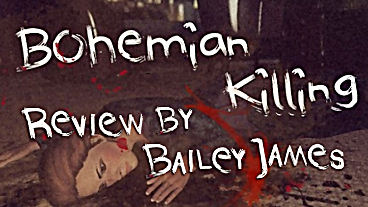
Bohemian Killing Review
A young woman has been murdered and all the evidence points to you… But did you do it? Yes. You did.







Genre: Murder mystery (with a twist)
Release date: July 21, 2016
It is Paris, 1894. The city is a sumptuous dream — fireworks erupt in the distance, framing the Eiffel Tower with colorful blooms, and moonlight dances along the cobblestone streets. You are an inventor, a bachelor, a gypsy, living a well-to-do bohemian life. But now they are calling you something else. A young woman has been murdered and all the evidence points to you. The court has called on you to testify, to clear your own name. But did you do it?
Yes. You did. You inarguably, indiscriminately, incontrovertibly committed a cold-blooded murder. But you don’t have to go down for it.
This is the conceit of Bohemian Killing, an inventive new game by The Moonwalls. Writer and developer Marcin Makaj has heavily utilized his law school expertise in creating an experience that tasks you with freeing yourself from a murder charge in the Parisian courts. You can do so through clever maneuvers or subterfuge, or you can fail to provide an adequate testimony and be jailed or beheaded. The outcome falls entirely on your shoulders.
Bohemian Killing takes the popular detective game formula and tweaks it with a clever and unexpected mechanic. Many die hard mystery lovers are used to games placing the emphasis on investigation -— give us a crime scene and we’ll toss it, uncovering the oversize footprints, the loose fabric threads, the dropped cigarette butts, the forgotten handkerchiefs. But this game isn’t just about finding evidence.
You, Alfred Ethon, sit on trial accused of murder, and you are asked to give testimony of your actions during a three-hour period. The player is dropped in the game world, which consists of Ethon’s apartment building, a nearby hotel, a café and the city street. As you wander around this area, ducking in and out of doorways, Ethon narrates all your actions. Gaze out the window or at a statue and he’ll note that he paused to admire the view. Take a sip of champagne and he’ll get drunk and react differently to anyone he encounters until the alcohol wears off. Pick up a sharp retractable knife in his workshop and Ethon will rationalize the danger he faces as a gypsy and why he needs to carry a weapon. Gradually the improvisations pile up into a story that, depending on how it’s told, can either condemn or exonerate you based on the decisions you make.
To guarantee your freedom, you’ll have to make your testimony align convincingly with a few set events —- you were spotted entering a hotel and later returning to your own apartment covered in blood. But was the blood from the murder, or from a fistfight at a nearby café? Or can you call the testimony of these witnesses into question by attacking their character? Once again, it’s your choice.
My first time playing the game, I was lost and disoriented. Without even understanding what had fully transpired, all I could do was canvass the area and see how Alfred reacted. I tried eating things, picking up objects, and exploring rooms for viable excuses. Frequently, I hit the walls of the game world, causing Alfred to declare, “I do not recall that part” when I tried to wander outside the boundary of his testimony. By searching the environment, I was uncovering the truth while constructing a lie.
For those who don’t enjoy too much fumbling around, the game has an optional hint system — you can agree to receive help from the prosecutor defending your case and receive reminders when important events that necessitate an alibi are about to occur. The specific alignment of times is an important element of crafting a believable case, so the game has given you a pocket watch to track the time. Need to move the clock forward to orchestrate a certain sequence of events? There are intentional time-wasters (magazines, telephones, inventing tables) that can speed the process along. You can always reference the events timeline and pieces of evidence you’ve discovered, and when you save the game, the court takes a recess for the day. These gameplay elements supplement and enhance the story being told rather than getting in its way.
By the end of my first attempt, I had collected some evidence (points of interest or artifacts that develop the story of why Alfred Ethon could have been driven to murder) and matched the timeline of events as closely as I could. Once I went to bed and ended my testimony, the prosecutor provided a final counterargument to the judge, noting the pieces of information I’d discovered as explanations of my actions. This defense is one of the real highlights of the game, providing insight into a legal system I was unfamiliar with before starting the game. But unsurprisingly, I had mounted a shoddy defense and was summarily beheaded.
I started up the game again, this time with a strategy. I had picked up the broad strokes of the action, not just where I was supposed to be but where other key players in the story were moving at the same time. As I maneuvered around, searching for new clues, I was repeatedly quizzed by the judge, who appears as a saffron-colored figure in the game world whenever he wants to interrogate a detail of your testimony. His scrutiny is, at times, unrelenting; and at others enlightening: revealing points of your story that aren’t currently convincing and need further embellishment the next time around. But despite my improvements, I was sentenced to the guillotine again.
Each subsequent playthrough yielded new information and alternate strategies. I discovered unorthodox ways to evade the law and finally made some breakthroughs so that on my fourth attempt I was found innocent. The victory was challenging and felt-well earned, and it was immensely satisfying to hear the prosecutor’s exculpatory argument before walking out of the prison a free man. The game rewards those with the patience to uncover its secrets.
Bohemian Killing tells a story that is entrenched in the past but at the same time deeply familiar. There is an objective truth that we know — our protagonist has killed a woman — but the details are what make him sympathetic or villainous. Alfred is a member of a new bohemian class but is still susceptible to perceptions of his gypsy roots. His existence is counter to the aristocratic regime that once held power, and this historic schism is at the center of the conflict between Alfred and the woman he killed. Issues of race, class, gender, art, and law all combine into a thought-provoking and ambiguous case.
Alfred Ethon’s pocket watch carries an inscription that translates as, “It is better to let the crime of the guilty go unpunished than to condemn the innocent.” It’s an unpleasant reminder that the legal system is imperfect. As much as we wish it were true, justice is not blind. In most investigative games, sufficient evidence clears a suspect or condemns a criminal. There is no uncertainty or delay before due process is served — if you can find enough evidence against someone, they will be jailed and punished accordingly.
But this is not how our own courts operate, and there is no such thing as absolute justice. Bohemian Killing reminds us that the courtroom is as much a playground and a puzzle as the crime scene.
|
+ Unique premise
+ Immersive historical story
+ Insight into European legal system
+ Expert voice acting and translation from the original Polish + Attractive graphics and immersive music
– Challenging — don’t expect to escape unpunished your first time through the game
|
 |
Processor: Intel Core 2 Duo 1,66 GHz
Memory: 4 GB RAM
Graphics: Radeon HD 7500G/Intel HD Graphics 3000
Processor: Intel Core i5 1.7
Memory: 4 GB RAM
Graphics: Radeon HD 7500G/Intel HD Graphics 3000


Leave a Reply